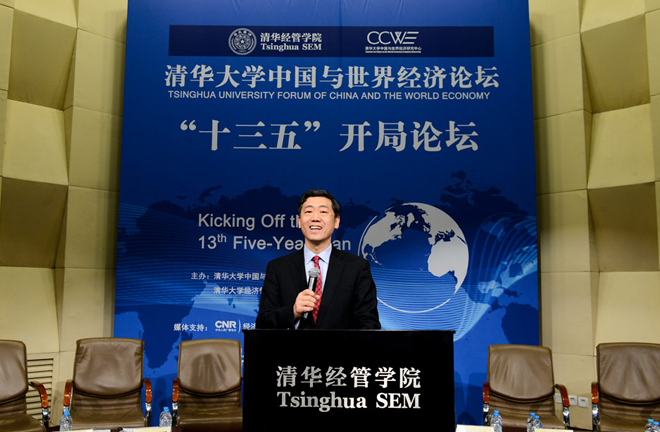Report: China will sustain stable, sound economic growth this year

Li Daokui, a professor from the Center for China in the World Economy at Tsinghua University,delivers a speech at the Tsinghua University Forum of China and the World Economy: Kicking off the 13th Five-Year Plan (2016-2020) in Beijing on Jan. 9.
At the Tsinghua University Forum of China and the World Economy: Kicking off the 13th Five-Year Plan (2016-2020), held in Beijing on Jan. 9, a report detailing the macroeconomic outlook for China in the first quarter of 2016 was released.
According to the report, the Chinese economy is still facing downward pressure this year, but it is expected to maintain stable growth under effective policy.
Optimistic prospects
“Compared with 1999, the external environment is more favorable to readjustment in the real economy,” said Li Daokui, a professor from the Center for China in the World Economy at Tsinghua University. He said China is optimizing its economic structure and experiencing good momentum in banking and employment. There will be microeconomic adjustments in debt that will not impact the aggregate economy, he added.
Cao Heping, a professor from the School of Economics at Peking University, said China will accelerate economic restructuring on the basis of new economic factors. The new growth points represented by “Internet Plus” and the deep reform in China’s capital market may sustain the economic growth during the new five-year period, he said.
“Despite negative effects, the Internet has stimulated progress in China,” said Li Qiang, head of the School of Social Sciences at Tsinghua University, adding that the penetration of the Internet has facilitated interpersonal communication, removed estrangement between different social groups, helped the government stay in tune with society and made the nation more sensitive to the public’s condition. “Moreover, accurate targeting measures are being implemented to end relative and absolute poverty. I’m optimistic about the future prospects,” he said.
Progress in real economy
At the forum, scholars and experts also discussed recent problems, such as the consistent decline in the growth of the real economy and the risks created by peer-to-peer credit transactions.
“However, there’s no need to worry too much,” Li said. Absorbing the excess capacity is an economic project that has a direct impact on people's lives, he said. But after a short period of difficulties, China's real economy will take on a new look, which will in turn promote the sound development of the financial market. The report predicts the two-child policy will result in 2 million to 2.5 million additional newborns from families that have higher income and consumption ability, which will contribute 0.2 percent of GDP growth.
Lei Dingming, a professor of economics at the Hongkong University of Science and Technology, said what is being referred to as excess capacity is actually maldistribution of capacity. Excess capacity in some areas is an indication of insufficient capacity in other areas, he said.
“The Chinese economy is undergoing a transition from growth at breakneck speed to moderately high growth, during which the actual growth rate may be lower than expected,” Cao said. He pointed out the three major challenges in the new five-year period.
Feeling the heat of anti-corruption efforts, local officials may be wary of testing the waters and unable to accomplish much, he said. Entering the middle-income stage, social instability will reduce the enthusiasm for and confidence in social construction. Moreover, structural transformation may pose problems to the environment, Cao said.
Many scholars said we should be more confident in the development of China. Liang Jianzhang, a professor from the Guanghua School of Management at Peking University, said the Chinese economy has strong fundamentals in the long term. “With a sufficient supply of human resources due to the increase in population and people of high quality, China will continue to be an engine for global economic development and investment.”
Healthy production, life
“The 13th Five-Year Plan proposed a strategy of building a ‘healthy China.’ The concept of health is used not only in health care but in other areas of production and living,” said Li Ling, a professor from the National School of Development at Peking University. A healthy China means sound development in all areas including economy, society, politics and ecology, she said.
Lei said more social resources are applied in production than in health and environmental protection. The improvement of the environment and health should also be included into the evaluation in order to encourage local governments to make improvements in this aspect, he suggested.
Liang said economic restructuring is closely related to education, health and the environment. Li Ling suggested that the new technologies and concepts of the Internet era be used in building a healthy China. She said, investment in this field will in turn stimulate the potential of the Chinese economy to grow.
Niu Dongjie is a reporter at the Chinese Social Sciences Today.

 PRINT
PRINT CLOSE
CLOSE